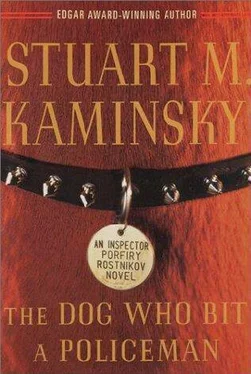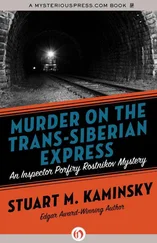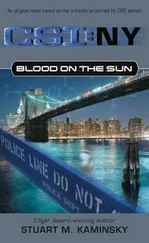Stuart Kaminsky - The Dog Who Bit a Policeman
Здесь есть возможность читать онлайн «Stuart Kaminsky - The Dog Who Bit a Policeman» весь текст электронной книги совершенно бесплатно (целиком полную версию без сокращений). В некоторых случаях можно слушать аудио, скачать через торрент в формате fb2 и присутствует краткое содержание. Жанр: Полицейский детектив, на русском языке. Описание произведения, (предисловие) а так же отзывы посетителей доступны на портале библиотеки ЛибКат.
- Название:The Dog Who Bit a Policeman
- Автор:
- Жанр:
- Год:неизвестен
- ISBN:нет данных
- Рейтинг книги:3 / 5. Голосов: 1
-
Избранное:Добавить в избранное
- Отзывы:
-
Ваша оценка:
- 60
- 1
- 2
- 3
- 4
- 5
The Dog Who Bit a Policeman: краткое содержание, описание и аннотация
Предлагаем к чтению аннотацию, описание, краткое содержание или предисловие (зависит от того, что написал сам автор книги «The Dog Who Bit a Policeman»). Если вы не нашли необходимую информацию о книге — напишите в комментариях, мы постараемся отыскать её.
The Dog Who Bit a Policeman — читать онлайн бесплатно полную книгу (весь текст) целиком
Ниже представлен текст книги, разбитый по страницам. Система сохранения места последней прочитанной страницы, позволяет с удобством читать онлайн бесплатно книгу «The Dog Who Bit a Policeman», без необходимости каждый раз заново искать на чём Вы остановились. Поставьте закладку, и сможете в любой момент перейти на страницу, на которой закончили чтение.
Интервал:
Закладка:
“Tell me, Inspector,” said Shatalov, handing a slice of pizza to the big man with the bad complexion and taking one for himself.
“How would you like to make a great deal of money?”
“I think not,” said Rostnikov. “It would change lifelong habits and disorient me. It might also, depending on the source of such sums, result in compromising me in the performance of my duties, duties that form the meaning of my life as a police officer.”
“Impressive,” said Shatalov. “Did you just think up that little speech?”
“Read it in an American novel, Ed McBain. It is a paraphrase but essentially accurate.”
“Ed McBain?”
“I will be happy to let you borrow a copy of one of his books on the condition that you kill no one for a week. Do you read English?”
“A bit,” said Shatalov with a mouthful of pizza, a string of cheese dangling from the corner of his mouth.
“It will be worth the effort. You agree to my conditions?”
Shatalov wiped the dangling cheese from his mouth, shrugged, and then nodded.
“If none of my people is attacked, I’ll consider your seven-day truce,” he said, putting down his napkin. “I’ll do better. I’ll do nothing for two weeks unless the one-eyed son-of-a-syphilitic-goat does something first.”
It was Rostnikov’s turn to nod.
“You want to hear a joke?” asked Shatalov, his mouth full of pizza.
“I can think of nothing I would like more,” said Rostnikov.
“Your wife is a Jew. It will help you to appreciate it more.”
Rostnikov said nothing. Shatalov, though he acted the fool, had subtly informed the inspector that he knew a great deal about him.
“Well,” said Shatalov. “There were these two cows about to be slaughtered kosher. The first cow asked the other one, ‘What’s cooking?’ The second cow said, ‘Don’t ask.’ ”
Shatalov laughed again. So did the big man with the bad complexion. Rostnikov did not laugh. He stood with some difficulty, pushing back the chair and working his artificial leg under him.
“You want to take the rest of this pizza?” Shatalov said. “We’ve had enough.”
“Why not?” said Rostnikov after a very brief pause. “I do not think my superior would consider half a large mushroom pizza a compromise of my principles.”
Shatalov laughed and pointed at the detective. The restaurant went silent. “I have a last question,” said the Chechin. “Did the Tatar hen dipped in sheep shit call me ‘Irving’?”
“I would prefer not to recall,” said Rostnikov.
“I think I’ll be seeing you soon,” said Shatalov, motioning to the waiting waiter, who hurried over and packaged the remaining half-pizza for the rumpled man with the bad leg who looked like a refrigerator.
And so it was that a weary Rostnikov entered his apartment on Krasikov Street with a treat for two little girls, their grandmother, and Sarah Rostnikov.
“Why are you not in bed?” he asked, handing the box to Laura, the elder.
Both children were wearing nightshirts.
“Grandmother said we could stay up and watch you picking up the heavy things.”
“We like to watch,” said the younger girl.
“I know,” said Rostnikov, taking off his jacket and hanging it on the rack near the front door.
Sarah got up and came to him, touching his face and looking at his eyes.
“Hungry?” she asked.
He shook his head. “Maybe later,” he said. “Have a piece of pizza.” The girls took the prize to their grandmother, who sat at the small table near the window.
“I’ve eaten,” said Sarah.
“Are you all right today?” he asked, very softly, examining her face.
Sarah Rostnikov had undergone surgery to remove a benign growth from her brain more than two years ago. Since the operation, she had periods of dizziness and took pills her cousin, Leon the doctor, gave her. There were days when she could not go to work, and only the fact that Porfiry Petrovich was an important chief inspector saved her job.
“I’m fine,” she said with a smile.
She had gained weight before her operation but had steadily grown more trim since. She looked, with her smooth pale skin and red hair, much as she had looked as a young woman. Illness had not aged her. On the contrary, it had, ironically, made her look younger.
There were no messages, no neighbors with toilet or sink problems, no urgent calls to contact his office.
The girls sat next to each other on the floor eating pizza while Rostnikov changed into his gray sweat suit, turned on a cassette of the American rock group Creedence Clearwater Revival. He had discovered the tape by accident, buying it for next to nothing at an outdoor market. Now it was one of his favorites. If he ever went to America, he would try to meet Ed McBain and John Fogarty, who sang and wrote most of the Creedence Clearwater songs. “Bad Moon Rising” began at the same moment Porfiry Petrovich lay back on the narrow bench he had pulled out from the cabinet against the wall. He lined up his weights and began. The women at the table talked softly, and the two little girls ate and watched the serious ritual that they knew was designed to make one stronger, only Rostnikov was already the strongest man in the world, they were certain. They had concluded some weeks ago that he simply enjoyed doing this, which struck them both as very strange, given the pain and grunting and sweat. Adults were very strange and unpredictable creatures.
Chapter Seven
That night in Moscow was a relatively quiet one.
A former farmer from a collective in Georgia, Anatoli Dudniki, weaved his way drunkenly down the middle of Kadashevskaya Prospekt, announcing to the hurtling taxis and cars that it was his sixty-fifth birthday. One driver, who had taken a few drinks himself, screeched to a halt directly in front of Anatoli, who leaned forward over the hood and laughed.
“Like a movie,” Anatoli said. “My life is like a movie now. You hear that?”
The man in the car opened his window and shouted, “Get out of the street, you drunken old bum, before you get killed.”
“You mean,” said Anatoli, none too steady on his feet, “my head could be run over like a melon, a plum, a cabbage, a grape, something? Squish, skwush?”
The man in the car closed his window and drove on.
Anatoli made it to the curb and sat down. A few cars passed but there were no pedestrians. There was a feeling of rain in the air as there had been all day. There was no moon. Anatoli had learned to recognize the coming of rain from his years on that pitiful collective farm where his now-dead wife had learned two hundred ways to prepare potatoes. Oddly enough, Anatoli still loved potatoes, and when others on the collective had complained at the diet, he had nodded in agreement though he did not agree.
“I love potatoes,” he shouted. “You hear that? I love them to little pieces. I could cry over them. I wish I had two potatoes now.
You know what I would do? I would eat one and give one to someone else. That’s the kind of man I am. That’s the kind of man I am.”
Now Anatoli worked in a bar, which was where he was coming from. He cleaned up after closing-sweeping, mopping, tending to the puke in the bathrooms, the sanitary napkins that blocked the toilets in the women’s room, the stuff that stuck to the floor and to the small bandstand. The pay was poor but he got to work alone and drink as much as he wanted to when he finished his cleanup each night. The management never checked the stock. Anatoli drank only the best.
The alcohol compensated for the dirty job, and he could, because he came at closing time, avoid the loud music from the small band trying to sound like Americans, and avoid the young people in stupid crazy clothes who did something they called dancing and laughed at nothing.
Читать дальшеИнтервал:
Закладка:
Похожие книги на «The Dog Who Bit a Policeman»
Представляем Вашему вниманию похожие книги на «The Dog Who Bit a Policeman» списком для выбора. Мы отобрали схожую по названию и смыслу литературу в надежде предоставить читателям больше вариантов отыскать новые, интересные, ещё непрочитанные произведения.
Обсуждение, отзывы о книге «The Dog Who Bit a Policeman» и просто собственные мнения читателей. Оставьте ваши комментарии, напишите, что Вы думаете о произведении, его смысле или главных героях. Укажите что конкретно понравилось, а что нет, и почему Вы так считаете.












